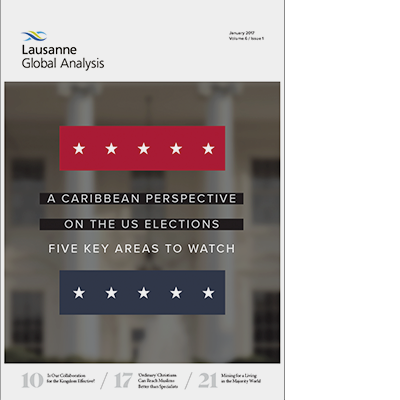Welcome to the January issue of Lausanne Global Analysis. We look forward to your feedback on it.
In this issue we firstly focus on the impact of the US presidential election campaign and its outcome on Christian ministry in other parts of the world. In the light of the elections, we invited Lausanne leaders from several regions to comment from their perspective. We received some very helpful surveys as well as one more-than-full-length analytical article by Las Newman and Minke Newman. The arrival of the latter enables us to feature our first ever LGA article written from a Caribbean perspective. We have added to it ‘Voices from other regions’ as a postscript, with brief excerpts from three regional surveys. We also feature two articles on networks and partnerships, one focused on evaluation of their effectiveness, and the other on the growing Mahabba network. We conclude with a piece on artisanal and small-scale mining in the majority world and how Christians can make a difference.
‘Throughout the Caribbean, there is real apprehension about the conduct and outcome of the election’, write Las Newman (Lausanne Global Associate Director for Regions) and Minke Newman (environmental biologist at University of the West Indies, Jamaica). As church leaders and other civil and political leaders in the Caribbean reflect on the process and outcome, they have identified five key areas to watch: the future of our climate, the protection of biblical teaching on marriage and family, free and fair trade, migration and the impact of globalization, and global peace and security. These five issues are the key areas for the region as a new US administration takes shape. Against this background, Paul’s advice to Timothy in 1 Timothy 2:1-2 about interceding for those in high positions is what every pastor needs at this time. ‘The impact these will have on Caribbean peoples’ ability to “lead a peaceful and quiet life, godly and dignified in every way” is vital to our survival and well-being’, they conclude.
‘The global church is now meeting virtually and in the field in hundreds of kingdom-focused networks’, writes Phill Butler (Senior Strategy Advisor, visionSynergy). Lacking collective action on the topic of network evaluation, the wider ministry community and those who support these efforts are destined for continued confusion about essentials and our ability to evaluate them. The urgency of the need is evident. This article highlights the challenges, progress, and options that now exist for evaluating these radically new structures shaping the future of ministry globally. Motivated primarily by the desire for the highest expression of stewardship, the evangelical community is faced with urgent challenges and unprecedented opportunity. The author concludes with five suggestions for action that could yield significant progress.
We are currently presented with one of the greatest opportunities of our time: to unveil Jesus to Muslim people in the Western world and bring them to Christ. ‘In this context, a new phenomenon networking both agencies and churches has proved to be a catalyst to unity and prayer’, writes Gordon Hickson (Director, Mahabba Network). This network is called Mahabba (‘love’ in Arabic). Its emphasis is on motivating and mobilizing ‘ordinary’ Christians rather than just ‘specialists’ to reach their Muslim neighbours. The model normally consists of a partnership between groups of churches. The essence is ordinary Christians being resourced by specialists, championed by local leaders in unity, committed to persistent prayer, and compelled by God’s love for Muslim people to unveil Jesus to them and help them grow in Christ. This often described as the ‘Mahabba Virus’ or ‘Love Virus’. ‘Surely this is the most contagious part of our faith’, he concludes.
‘Recent media articles have highlighted the emerging phenomenon of artisanal and small-scale mining (ASM) in the majority world’, writes Terry Garde (Trustee, International Miners’ Mission). Over 100 million people base their livelihoods on such mining with minimal equipment, capital, and training. While an important income source, ASM creates social, economic, legal, and environmental impacts, including uncontrolled use of mercury in gold mining. The Fairtrade Foundation and others have produced a set of standards for responsible ASM. Christians can help, for example, as consumers by putting pressure on their local jewellers to subscribe to fair trade systems. Readers can also help by seeking to raise the profiles of organisations which are trying to promote responsible mining. ‘It comes down to Christians worldwide catching this wave of opportunity and making positive changes in response to the challenges of ASM’, he concludes.
Whether you are planning to read the full articles or just the executive summaries, we hope that you find this issue stimulating and useful. Our aim is to deliver strategic and credible analysis, information, and insight so that as an influencer you will be better equipped for the task of global mission. It’s our desire that the analysis of current and future trends and developments will help you and your team make better decisions about the stewardship of all that God has entrusted to your care.
Please send any questions and comments about this issue to [email protected]. The next issue of Lausanne Global Analysis will be released in March.

